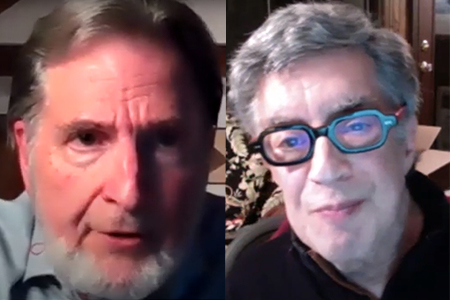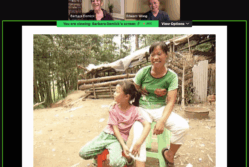Event Coverage Highlight

Jim Laurie Recounts ‘Coming of Age’ Memoir Amid Indochina Wars
by Chad Bouchard
When OPC member Jim Laurie landed in Cambodia at age 22 in the early 1970s, he reckons he was “the greenest combat reporter in Cambodia and Vietnam at the time.” Laurie, an award-winning broadcast journalist who covered Southeast Asian conflicts and aftermath for NBC News and ABC News, wrote a memoir of his experiences, titled Last Helicopter: Two Lives in Indochina.
During an online OPC program on Nov. 12, he described the book as a “coming of age” story for a young journalist navigating the trials of war reporting, as dawn broke on the revolution and rise of the Khmer Rouge. OPC Past President David A. Andelman moderated the discussion.
Laurie said part of his motivation for writing the book was a quest to answer his own long-held question about the nature of survival: “Why under extraordinary and horrible conditions, do some survive, and some do not?”
The book focuses on the story of Soc Sinan, a 21-year-old woman he met during his travels in in the early 1970s. The two fell in love and spent less than a year together before he was pulled away in 1972 to cover the Vietnam War for NBC News. He returned to Phnom Penh in 1975 as the Khmer Rouge was at the gates of the capital.
During the program, Laurie showed footage that he shot during the era, depicting Khmer ballet, early buildup of war refugees in Phnom Penh, news reports about the taking of the city in 1975, and Laurie’s news broadcasts from Saigon during its evacuation and fall to North Vietnam.
The presentation included 8mm footage he shot during his departure on April 12, 1975 among 289 people that U.S. marines helicoptered out of the city. His friend Sinan was not among them.
“She had failed to make the last helicopter, and she began a remarkable and terrifying struggle to survive Khmer Rouge rule and the infamous ‘killing fields,’” Laurie said.
Andelman met Laurie while he was on his first assignment in Cambodia for The New York Times, and said Laurie had been a “kind colleague to a neophyte.” He asked Laurie whether he had considered staying in Phnom Penh after April 1975, perhaps bringing Soc Sinan to the American embassy and trying to shuttle her out of the country.
Laurie said he was not able to find her at the time and had hoped to be able to return later. Laurie said many Cambodians seemed resigned to the regime change and were not clamoring to be airlifted out, unlike with the fall of Saigon later that month.
Laurie returned to Cambodia in 1979 following the Vietnamese invasion and started traveling the country for two months later that year. Andelman asked about his reaction to seeing some of the nearly 200 “killing field” execution centers and horrors of the Khmer Rouge.
“Walking through these areas was very disturbing,” he said. “There were some killing fields where remnants of clothing were still with the skeletal remains of those who had died. It was absolutely horrifying.”
Laurie said after the Pol Pot regime fell in 1979, many survivors in Cambodia ended up living in communities along with their former captors.
“When I visited Cambodia after the war, there were extraordinary cases of people who had been victimized, living right next door to people who had been their tormentors,” he said.
Laurie said after the Vietnamese invaded Cambodia, they retrained former Khmer Rouge members who were loyal to Vietnam and many of those people went on to work in government, including Cambodia’s current prime minister, Hun Sen, among others.
“He was a soldier in the Khmer Rouge, taken in by the Vietnamese, flown up to Hanoi, given indoctrination by the Communist Party in Vietnam, and placed back as the Vietnamese ‘puppet’ in Phnom Penh in ‘79.”
Laurie said it took remarkably long to put together war crimes trials to prosecute members of the Khmer Rouge. The Extraordinary Chambers in the Courts of Cambodia Court, backed by the United Nations, launched in 1997 and a decade later began trying only a handful of senior leaders. To date, only five people have been indicted by the Court for genocide, crimes against humanity or war crimes, three of which were convicted and sentenced to life in prison.
“That was a very limited prosecution of those guilty of genocide in Cambodia,” he said. “The issue is, everybody and nobody was accountable. Nobody seemed to have the appetite [for a tribunal]. You had the Chinese who were culpable, you had the Americans who were culpable, you had the Vietnamese – you had nobody who really had clean hands in this. You had so many nations in the Cambodian story who were sharing guilt that there was very little room for a clear-cut resolution.”
During a Q&A with audience members, he was asked about lessons learned from American intervention in Cambodia and possible parallels with Afghanistan.
“The fact that Cambodia was dragged into the war, mainly because of a strategy that Richard Nixon had to get American troops out of Vietnam, was one of the greatest tragedies that we’ve had, in my view, in terms of American military involvement overseas,” he said.
Laurie added that he predicts the U.S.-backed government installed in Kabul will not survive much longer as the American presence draws down, just as the governments of South Vietnam and Cambodia did not survive much longer after American withdrawal.




